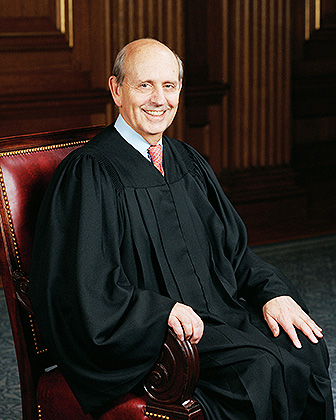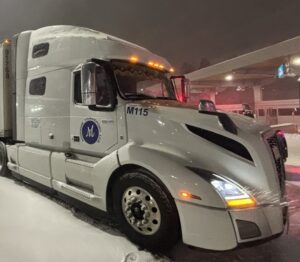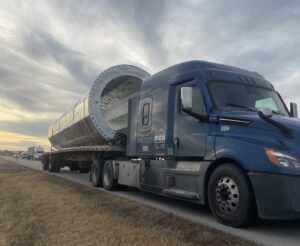WASHINGTON D.C. – U.S. Supreme Court Justice Stephen Breyer left a mark on the transportation industry during his 27-plus years on the bench.
Breyer announced his retirement in late January.
Here are five of his most notable rulings when it comes to logistics and transportation in the U.S., according to Law360.
Rowe v. New Hampshire Motor Transport AssociationIn 2008 justices unanimously held in Rowe v. New Hampshire Motor Transport Association that federal law preempted two provisions in a Maine statute restricting the shipping and delivery of tobacco products.Maine law barred anyone that wasn’t a Maine-licensed tobacco retailer from accepting tobacco deliveries and prohibited anyone from knowingly transporting a “tobacco product” to “a person” in Maine.Trucking associations sued and the justices agreed that the law was precisely the kind of state-mandated regulation that is preempted by the Federal Aviation Administration Authorization Act of 1994, which bars states from enacting or enforcing laws “related to a price, route or service of any motor carrier.”Geier v. American Honda Motor Co.
The Supreme Court took up the case of injured plaintiff Alexis Geier, who sought to hold American Honda Motor Co. liable for negligence over an accident involving a 1987 Honda Accord that wasn’t equipped with a driver’s side airbag in 2000.
In a 5-4 ruling, Justice Breyer wrote for the majority that the National Traffic and Motor Vehicle Safety Act of 1966, together with U.S. Department of Transportation regulations, preempted Geier’s state tort suit.
Breyer determined that Geier’s “no airbag” suit conflicted with federal law because it sought to impose a duty on automakers that “would have presented an obstacle to the variety and mix of devices that the federal regulation sought.”
Williamson v. Mazda Motor of America Inc.
The high court again took up the issue in a case against Mazda Motor of America Inc. brought by the family of Thanh Williamson. Williamson was wearing a lap-only seat belt in 2002 and was killed when the 1993 Mazda minivan she was riding in hit another vehicle.
Federal law allowed vehicles to have lap-only seat belts when the vehicle was made. The family sued Mazda under California state law, claiming the vehicle should have had a lap-and-shoulder seat belt and that Mazda failed to warn consumers of the risk of lap-only belts.
The Mazda case concerned FMVSS 208 and justices agreed to take up the Mazda case in order to further clarify their Geier holding, given that courts had been interpreting Geier as protecting car companies from state law claims as long as they complied with federal regulations.
Under the 1989 version of FMVSS 208, automakers were required to install seat belts in the rear seats of passenger vehicles. They could choose what type of belt to install on rear inner seats, such as middle seats or those next to a minivan’s aisle.
Justices unanimously held in 2011’s Williamson v. Mazda Motor of America Inc. that federal law did not preempt the Williamsons’ state tort suit. Justice Breyer wrote that providing manufacturers with the choice of seat belts was not a significant regulatory objective.
American Trucking Associations Inc. et al. v. Michigan Public Service Commission et al.; and Mid-Con Freight Systems Inc. et al., Petitioners v. Michigan Public Service Commission et al.
Justice Breyer authored two opinions in June 2005 on two trucking industry challenges to a flat $100 annual fee that Michigan imposed on trucks engaged in intrastate commercial hauling.
Mid-Con Freight Systems Inc. claimed Michigan’s fee ignored federal law establishing the Single State Registration System or SSRS. That’s the system that allows trucking companies to fill out one set of forms in one state which in turn registers its federal permit in every participating state through which its trucks travel.
The company said the SSRS statute specifies a state may not impose any additional “registration requirement” or other obligations that constitute “an unreasonable burden.” In a 6-3 ruling, Justice Breyer and the majority of other justices said preemption did not apply.
The American Trucking Associations and trucking company USF Holland Inc. also challenged the state’s flat fee, via a different argument. They claimed the fee violated the dormant commerce clause by imposing an unconstitutional burden on interstate trade.
The court disagreed.
“We find nothing in [the Michigan law] that offends the Commerce Clause,” Breyer wrote in the court’s opinion. “The statute applies evenhandedly to all carriers that make domestic journeys. It does not reflect an effort to tax activity that takes place, in whole or in part, outside the state. Nothing in our case law suggests that such a neutral, locally focused fee or tax is inconsistent with the dormant Commerce Clause.”
The Trucker News Staff produces engaging content for not only TheTrucker.com, but also The Trucker Newspaper, which has been serving the trucking industry for more than 30 years. With a focus on drivers, the Trucker News Staff aims to provide relevant, objective content pertaining to the trucking segment of the transportation industry. The Trucker News Staff is based in Little Rock, Arkansas.















